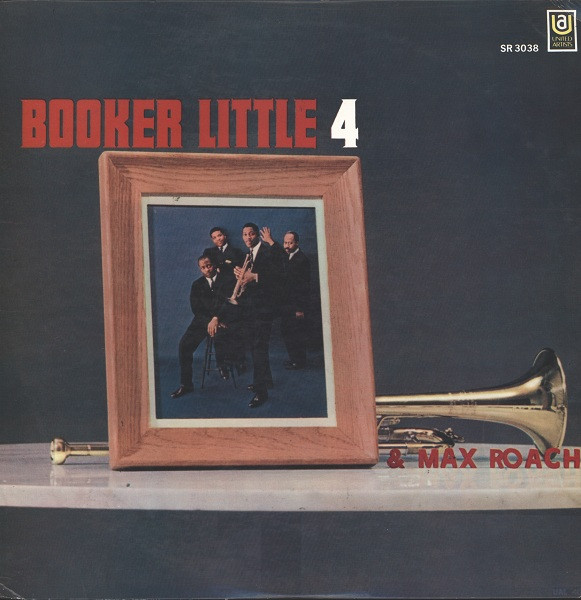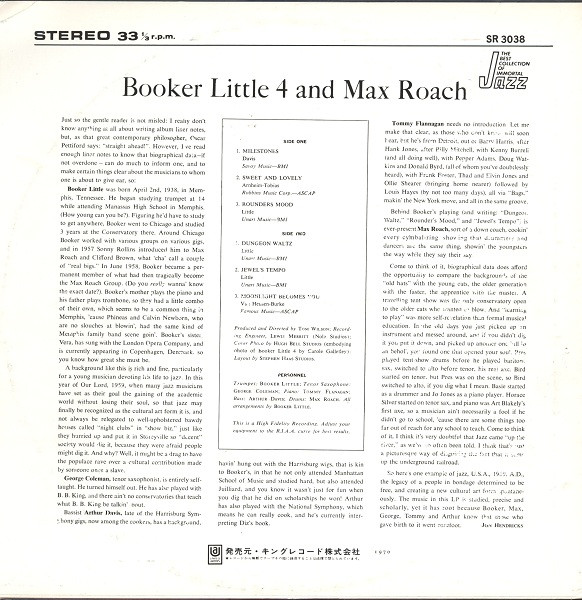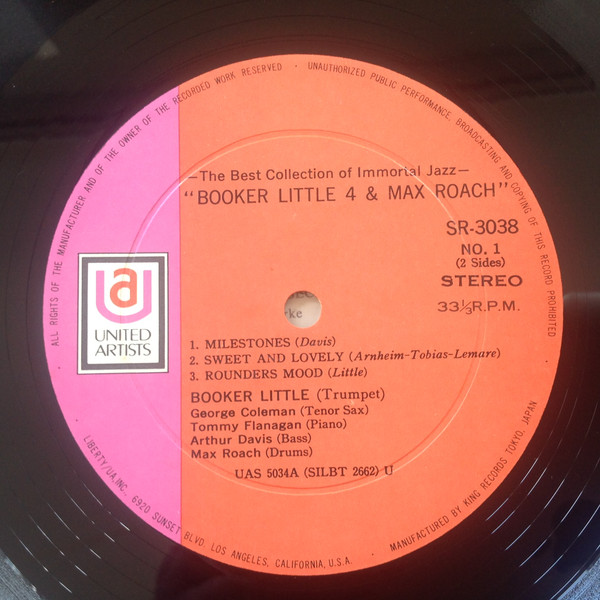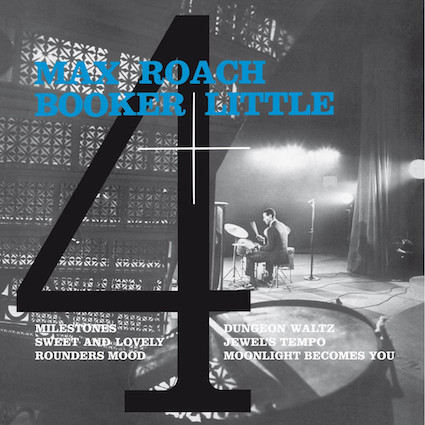Booker Little 4 And Max Roach - Booker Little 4 Max Roach
Table of Contents
Download
Filename: booker-little-4-and-max-roach-booker-little-4-max-roach.zip- MP3 size: 39.2 mb
- FLAC size: 441.6 mb
Tracks
| Track | Duration | Preview |
|---|---|---|
| Rounders Mood | 5:22 | |
| Sweet And Lovely | 4:15 | |
| Moonlight Becomes You | 5:40 | |
| Jewel's Tempo | 6:37 | |
| Dungeon Valtz | ||
| Jawel's Tempo | ||
| Milestones | 5:36 | |
| Dungeon Waltz | 4:30 |
Video
Booker Little 4 & Max Roach - 1958 - 05 Jewel's Tempo
Booker Little 4 & Max Roach - 1958 - 07 Things Ain't What They Used To Be
Booker Little 4 & Max Roach - 1958 - 06 Moonlight Becomes You
Booker Little 4 & Max Roach - 1958 - 01 Milestones
Booker Little 4 & Max Roach - 1958 - 08 Blue 'N' Boogie
Booker Little 4 & Max Roach - 1958 - 03 Rounder's Mood
Booker Little 4 & Max Roach - 1958 - 04 Dungeon Waltz
Booker Little 4 & Max Roach - 1958 - 02 Sweet and Lovely
Images




Catalog Numbers
- DOL786
- SR 3038, SR-3038
Labels
- DOL
- United Artists Records
Listen online
- escuchar en línea
- ascolta in linea
- online luisteren
- écouter en ligne
- kuunnella verkossa
- lyssna på nätet
- online anhören
- lytte på nettet
- ouvir online
Formats
- Vinyl
- LP
- Album
- Reissue
- HQ Virgin 140 Gram
- Stereo
Companies
| Role | Company |
|---|---|
| Printed By | DOL |
| Manufactured By | King Record Co. Ltd |
| Recorded At | Nola Recording Studios |
Credits
| Role | Credit |
|---|---|
| Bass | Arthur Davis |
| Drums | Max Roach |
| Photography By | H. Leonard |
| Piano | Tommy Flanagan |
| Tenor Saxophone | George Coleman |
| Trumpet | Booker Little |
| Engineer | Lewis Merritt |
| Liner Notes | Jon Hendricks |
| Producer | Tom Wilson |
Notes
- Manufactured in Europe. HQ Virgin Vinyl 140 gram. Printed in 2014 by DOL, a trademark of VINYLOGY.
- Recorded at Nola Studios, New York City in October, 1958.
- Comes with lp-sized insert.
Barcodes
Barcode: 8 89397 27861 8About Booker Little 4 And Max Roach
Name Vars
- Booker Little Four
Members
- George Coleman
- Tommy Flanagan
- Art Davis
- Booker Little
Comments
2023-04-12
Wonderful group of Memphis Jazz musicians. A treat to hear Phineas Newborn.
2023-04-11
Review 1/1
Just so the gentle reader is not misled: I really don't know anything at all about writing album liner notes, but, as that great contemporary philosopher, Oscar Pettiford says: "Straight ahead". However, I've read enough liner notes to know that biographical data - if not overdone - can do much to inform one, and to make certain things clear about the musicians to whom one is about to give ear, so: Booker Little was born April 2, 1938, in Memphis, Tennessee. He began studying trumpet at 14 while attending Manassas High School in Memphis. (How young can you be?) Figuring he'd have to study to get anywhere, Booker went to Chicago and studied 3 years at the Conservatory there. Around Chicago Booker worked with various groups on various gigs, and in 1957 Sonny Rollins introduced him to Max Roach and Clifford Brown, what 'cha' call a couple of "real bigs". In June 1958, Booker became a permanent member of what had than tragically become the Max Roach group. (Do you really wanna' know the exact date?) Booker's mother plays the piano and his father plays trombone, so they had a little combo of their own, which seems to be a common thing in Memphis, 'cause Phineas and Calvin Newborn, who are no slouches at blowin', had the same kind of Memphis family band scene goin'. Booker's sister, Vera, has sung with the London Opera Company, and is currently appearing in Copenhagen, Denmark, so you know how great she must be.
A background like this is rich and fine, particularly for a young musician devoting his life to jazz. In this year of Our Lord, 1959, when many jazz musicians have set as their goal the gaining of the academic world without losing their soul, so that jazz may finally be recognized as the cultural art form it is, and not always be relagated to well-upholstered bawdy houses called "night clubs" in "show biz," just like they hurried up and put it in Storeyville so "decent" society would dig it, because they were afraid people might dig it. And why? Well, it might be a drag to have the populace rave over a cultural contribution made by someone once a slave.
George Coleman, tenor saxophonist, is entirely self-taught. He turned himself out. He has also played with B.B. King, and there ain't no conservatories that teach what B.B. King be talkin' about.
Bassist Arthur Davis, late of Harrisburg Symphony gigs, now among the cookers, has a background, havin' hung out with the Harrisburg wigs, that is kin to Booker's, in that he not only attended the Manhattan School of Music and studied hard, but also attended Julliard, and you know it wasn't just for fun when you dig that he did on scholarships he won! Arthur has also played with the National Symphony, which means he can really cook, and he's currently interpreting Diz's book.
Tommy Flanagan needs no introduction. Let me make that clear, as those who don't know will soon hear, but he's from Detroit, out of Barry Harris, after Hank Jones, after Billy Mitchell, with Kenny Burrell (and all doing well), with Pepper Adams, Doug watkins and Donald Byrd, (all of whom you've doubtlessly heard), with Frank Foster, Thad and Elvin Jones and 011ie Shearer (bringing home nearer) followed by Louis Hayes (by not too many days), all via "Bags," makin' the New York move, and all in the same groove.
Behind Booker's playing (and writing: "Dungeon Waltz," "Rounder's Mood" and "Jewel's Tempo") is ever-present Max Roach, sort of a down coach, cookin' every cymbal-ring, showing that drummers and dancers are the same thing, showin' the youngsters the way while they say their say.
Come to think of it, biographical data does afford the opportunity to compare the backgrounds of the "old hats" with the young cats, the older generation with the faster, the apprentice with the master. A travelling tent show was the only conservatory open to the older cats who wanted to blow. And "learning to play" was more self-revelation than formal musical education. In the old days, you just picked up an instrument and messed around, and if you didn't dig It you put it down, and picked up another one 'till to and behol', you found one that opened your soul. Pres played tentshow drums before he played baritone sax, switched to alto before tenor, his real axe. Bird started on tenor, but Pres was on the scene, so Bird switched to alto, if you dig what I mean. Basie started as a drummer and Jo Jones as a piano player. Horace Silver started on tenor sax, and piano was Art Blakey's first axe, so a musician ain't necessarily a fool if he didn't go to school, 'cause there are some things too far out of reach for any school to teach. Come to think of it, I think it's very doubtful that Jazz came "up the river
Just so the gentle reader is not misled: I really don't know anything at all about writing album liner notes, but, as that great contemporary philosopher, Oscar Pettiford says: "Straight ahead". However, I've read enough liner notes to know that biographical data - if not overdone - can do much to inform one, and to make certain things clear about the musicians to whom one is about to give ear, so: Booker Little was born April 2, 1938, in Memphis, Tennessee. He began studying trumpet at 14 while attending Manassas High School in Memphis. (How young can you be?) Figuring he'd have to study to get anywhere, Booker went to Chicago and studied 3 years at the Conservatory there. Around Chicago Booker worked with various groups on various gigs, and in 1957 Sonny Rollins introduced him to Max Roach and Clifford Brown, what 'cha' call a couple of "real bigs". In June 1958, Booker became a permanent member of what had than tragically become the Max Roach group. (Do you really wanna' know the exact date?) Booker's mother plays the piano and his father plays trombone, so they had a little combo of their own, which seems to be a common thing in Memphis, 'cause Phineas and Calvin Newborn, who are no slouches at blowin', had the same kind of Memphis family band scene goin'. Booker's sister, Vera, has sung with the London Opera Company, and is currently appearing in Copenhagen, Denmark, so you know how great she must be.
A background like this is rich and fine, particularly for a young musician devoting his life to jazz. In this year of Our Lord, 1959, when many jazz musicians have set as their goal the gaining of the academic world without losing their soul, so that jazz may finally be recognized as the cultural art form it is, and not always be relagated to well-upholstered bawdy houses called "night clubs" in "show biz," just like they hurried up and put it in Storeyville so "decent" society would dig it, because they were afraid people might dig it. And why? Well, it might be a drag to have the populace rave over a cultural contribution made by someone once a slave.
George Coleman, tenor saxophonist, is entirely self-taught. He turned himself out. He has also played with B.B. King, and there ain't no conservatories that teach what B.B. King be talkin' about.
Bassist Arthur Davis, late of Harrisburg Symphony gigs, now among the cookers, has a background, havin' hung out with the Harrisburg wigs, that is kin to Booker's, in that he not only attended the Manhattan School of Music and studied hard, but also attended Julliard, and you know it wasn't just for fun when you dig that he did on scholarships he won! Arthur has also played with the National Symphony, which means he can really cook, and he's currently interpreting Diz's book.
Tommy Flanagan needs no introduction. Let me make that clear, as those who don't know will soon hear, but he's from Detroit, out of Barry Harris, after Hank Jones, after Billy Mitchell, with Kenny Burrell (and all doing well), with Pepper Adams, Doug watkins and Donald Byrd, (all of whom you've doubtlessly heard), with Frank Foster, Thad and Elvin Jones and 011ie Shearer (bringing home nearer) followed by Louis Hayes (by not too many days), all via "Bags," makin' the New York move, and all in the same groove.
Behind Booker's playing (and writing: "Dungeon Waltz," "Rounder's Mood" and "Jewel's Tempo") is ever-present Max Roach, sort of a down coach, cookin' every cymbal-ring, showing that drummers and dancers are the same thing, showin' the youngsters the way while they say their say.
Come to think of it, biographical data does afford the opportunity to compare the backgrounds of the "old hats" with the young cats, the older generation with the faster, the apprentice with the master. A travelling tent show was the only conservatory open to the older cats who wanted to blow. And "learning to play" was more self-revelation than formal musical education. In the old days, you just picked up an instrument and messed around, and if you didn't dig It you put it down, and picked up another one 'till to and behol', you found one that opened your soul. Pres played tentshow drums before he played baritone sax, switched to alto before tenor, his real axe. Bird started on tenor, but Pres was on the scene, so Bird switched to alto, if you dig what I mean. Basie started as a drummer and Jo Jones as a piano player. Horace Silver started on tenor sax, and piano was Art Blakey's first axe, so a musician ain't necessarily a fool if he didn't go to school, 'cause there are some things too far out of reach for any school to teach. Come to think of it, I think it's very doubtful that Jazz came "up the river
2023-04-11
Uplifting!
2023-04-10
Exquisite playing and use of chromatics. Booker captures a bit of Clifford yet retains his own sound.
2023-04-10
This should have far more views. Booker Little was an artist on the trumpet, an artist of profound and noble beauty.
To think he was only 20 years old here and would be dead just 3 years later…
To think he was only 20 years old here and would be dead just 3 years later…
2023-04-10
Wonderful stuff !!!
2023-04-09
Just as clean as Clifford, melodically he would've gotten there, had all the skills
2023-04-09
I think they got the writing credit wrong for this Milestones. It was written by John Lewis for Miles Davis (even though the Savoy record shows Miles Davis as the composer).
Miles composed a totally different modal piece, Milestones, later.
Miles composed a totally different modal piece, Milestones, later.
2023-04-08
Review 1/1
Just so the gentle reader is not misled: I really don't know anything at all about writing album liner notes, but, as that great contemporary philosopher, Oscar Pettiford says: "Straight ahead". However, I've read enough liner notes to know that biographical data - if not overdone - can do much to inform one, and to make certain things clear about the musicians to whom one is about to give ear, so: Booker Little was born April 2, 1938, in Memphis, Tennessee. He began studying trumpet at 14 while attending Manassas High School in Memphis. (How young can you be?) Figuring he'd have to study to get anywhere, Booker went to Chicago and studied 3 years at the Conservatory there. Around Chicago Booker worked with various groups on various gigs, and in 1957 Sonny Rollins introduced him to Max Roach and Clifford Brown, what 'cha' call a couple of "real bigs". In June 1958, Booker became a permanent member of what had than tragically become the Max Roach group. (Do you really wanna' know the exact date?) Booker's mother plays the piano and his father plays trombone, so they had a little combo of their own, which seems to be a common thing in Memphis, 'cause Phineas and Calvin Newborn, who are no slouches at blowin', had the same kind of Memphis family band scene goin'. Booker's sister, Vera, has sung with the London Opera Company, and is currently appearing in Copenhagen, Denmark, so you know how great she must be.
A background like this is rich and fine, particularly for a young musician devoting his life to jazz. In this year of Our Lord, 1959, when many jazz musicians have set as their goal the gaining of the academic world without losing their soul, so that jazz may finally be recognized as the cultural art form it is, and not always be relagated to well-upholstered bawdy houses called "night clubs" in "show biz," just like they hurried up and put it in Storeyville so "decent" society would dig it, because they were afraid people might dig it. And why? Well, it might be a drag to have the populace rave over a cultural contribution made by someone once a slave.
George Coleman, tenor saxophonist, is entirely self-taught. He turned himself out. He has also played with B.B. King, and there ain't no conservatories that teach what B.B. King be talkin' about.
Bassist Arthur Davis, late of Harrisburg Symphony gigs, now among the cookers, has a background, havin' hung out with the Harrisburg wigs, that is kin to Booker's, in that he not only attended the Manhattan School of Music and studied hard, but also attended Julliard, and you know it wasn't just for fun when you dig that he did on scholarships he won! Arthur has also played with the National Symphony, which means he can really cook, and he's currently interpreting Diz's book.
Tommy Flanagan needs no introduction. Let me make that clear, as those who don't know will soon hear, but he's from Detroit, out of Barry Harris, after Hank Jones, after Billy Mitchell, with Kenny Burrell (and all doing well), with Pepper Adams, Doug watkins and Donald Byrd, (all of whom you've doubtlessly heard), with Frank Foster, Thad and Elvin Jones and 011ie Shearer (bringing home nearer) followed by Louis Hayes (by not too many days), all via "Bags," makin' the New York move, and all in the same groove.
Behind Booker's playing (and writing: "Dungeon Waltz," "Rounder's Mood" and "Jewel's Tempo") is ever-present Max Roach, sort of a down coach, cookin' every cymbal-ring, showing that drummers and dancers are the same thing, showin' the youngsters the way while they say their say.
Come to think of it, biographical data does afford the opportunity to compare the backgrounds of the "old hats" with the young cats, the older generation with the faster, the apprentice with the master. A travelling tent show was the only conservatory open to the older cats who wanted to blow. And "learning to play" was more self-revelation than formal musical education. In the old days, you just picked up an instrument and messed around, and if you didn't dig It you put it down, and picked up another one 'till to and behol', you found one that opened your soul. Pres played tentshow drums before he played baritone sax, switched to alto before tenor, his real axe. Bird started on tenor, but Pres was on the scene, so Bird switched to alto, if you dig what I mean. Basie started as a drummer and Jo Jones as a piano player. Horace Silver started on tenor sax, and piano was Art Blakey's first axe, so a musician ain't necessarily a fool if he didn't go to school, 'cause there are some things too far out of reach for any school to teach. Come to think of it, I think it's very doubtful that Jazz came "up the river
Just so the gentle reader is not misled: I really don't know anything at all about writing album liner notes, but, as that great contemporary philosopher, Oscar Pettiford says: "Straight ahead". However, I've read enough liner notes to know that biographical data - if not overdone - can do much to inform one, and to make certain things clear about the musicians to whom one is about to give ear, so: Booker Little was born April 2, 1938, in Memphis, Tennessee. He began studying trumpet at 14 while attending Manassas High School in Memphis. (How young can you be?) Figuring he'd have to study to get anywhere, Booker went to Chicago and studied 3 years at the Conservatory there. Around Chicago Booker worked with various groups on various gigs, and in 1957 Sonny Rollins introduced him to Max Roach and Clifford Brown, what 'cha' call a couple of "real bigs". In June 1958, Booker became a permanent member of what had than tragically become the Max Roach group. (Do you really wanna' know the exact date?) Booker's mother plays the piano and his father plays trombone, so they had a little combo of their own, which seems to be a common thing in Memphis, 'cause Phineas and Calvin Newborn, who are no slouches at blowin', had the same kind of Memphis family band scene goin'. Booker's sister, Vera, has sung with the London Opera Company, and is currently appearing in Copenhagen, Denmark, so you know how great she must be.
A background like this is rich and fine, particularly for a young musician devoting his life to jazz. In this year of Our Lord, 1959, when many jazz musicians have set as their goal the gaining of the academic world without losing their soul, so that jazz may finally be recognized as the cultural art form it is, and not always be relagated to well-upholstered bawdy houses called "night clubs" in "show biz," just like they hurried up and put it in Storeyville so "decent" society would dig it, because they were afraid people might dig it. And why? Well, it might be a drag to have the populace rave over a cultural contribution made by someone once a slave.
George Coleman, tenor saxophonist, is entirely self-taught. He turned himself out. He has also played with B.B. King, and there ain't no conservatories that teach what B.B. King be talkin' about.
Bassist Arthur Davis, late of Harrisburg Symphony gigs, now among the cookers, has a background, havin' hung out with the Harrisburg wigs, that is kin to Booker's, in that he not only attended the Manhattan School of Music and studied hard, but also attended Julliard, and you know it wasn't just for fun when you dig that he did on scholarships he won! Arthur has also played with the National Symphony, which means he can really cook, and he's currently interpreting Diz's book.
Tommy Flanagan needs no introduction. Let me make that clear, as those who don't know will soon hear, but he's from Detroit, out of Barry Harris, after Hank Jones, after Billy Mitchell, with Kenny Burrell (and all doing well), with Pepper Adams, Doug watkins and Donald Byrd, (all of whom you've doubtlessly heard), with Frank Foster, Thad and Elvin Jones and 011ie Shearer (bringing home nearer) followed by Louis Hayes (by not too many days), all via "Bags," makin' the New York move, and all in the same groove.
Behind Booker's playing (and writing: "Dungeon Waltz," "Rounder's Mood" and "Jewel's Tempo") is ever-present Max Roach, sort of a down coach, cookin' every cymbal-ring, showing that drummers and dancers are the same thing, showin' the youngsters the way while they say their say.
Come to think of it, biographical data does afford the opportunity to compare the backgrounds of the "old hats" with the young cats, the older generation with the faster, the apprentice with the master. A travelling tent show was the only conservatory open to the older cats who wanted to blow. And "learning to play" was more self-revelation than formal musical education. In the old days, you just picked up an instrument and messed around, and if you didn't dig It you put it down, and picked up another one 'till to and behol', you found one that opened your soul. Pres played tentshow drums before he played baritone sax, switched to alto before tenor, his real axe. Bird started on tenor, but Pres was on the scene, so Bird switched to alto, if you dig what I mean. Basie started as a drummer and Jo Jones as a piano player. Horace Silver started on tenor sax, and piano was Art Blakey's first axe, so a musician ain't necessarily a fool if he didn't go to school, 'cause there are some things too far out of reach for any school to teach. Come to think of it, I think it's very doubtful that Jazz came "up the river
2023-04-07
beautiful tone
2023-04-07
Check out Jazz 88 www.wbgo.org ?
Related albums
Песни Советских Композиторов Русские Народные Песни
Государственный Воронежский Русский Народный Хор
